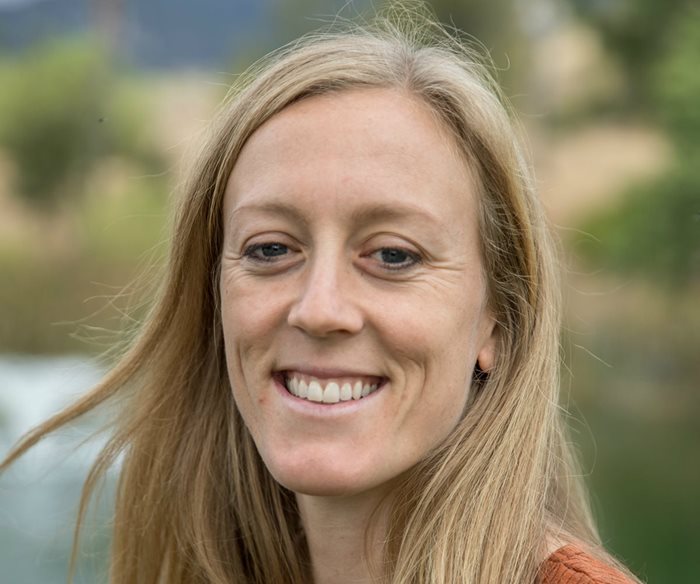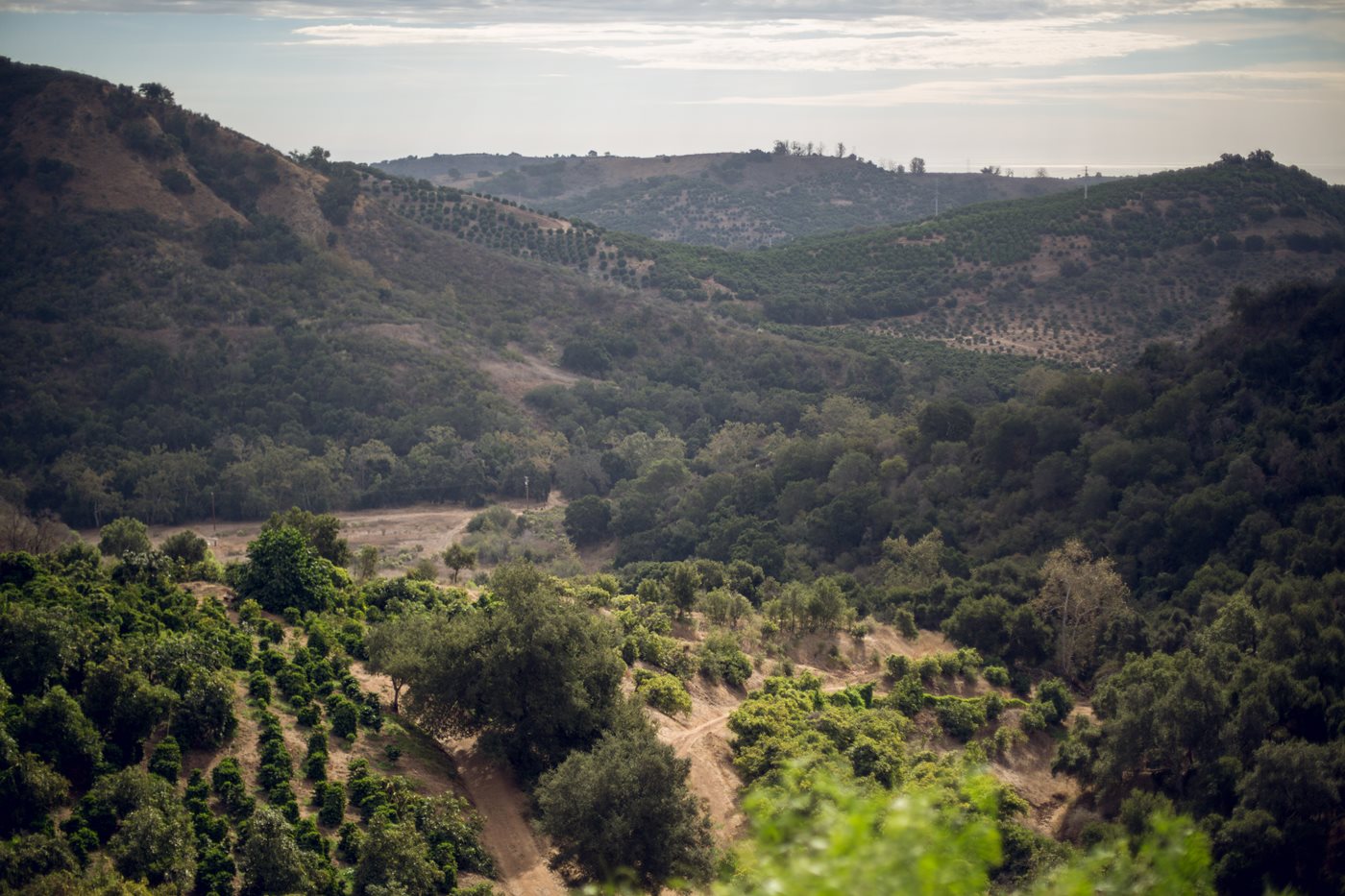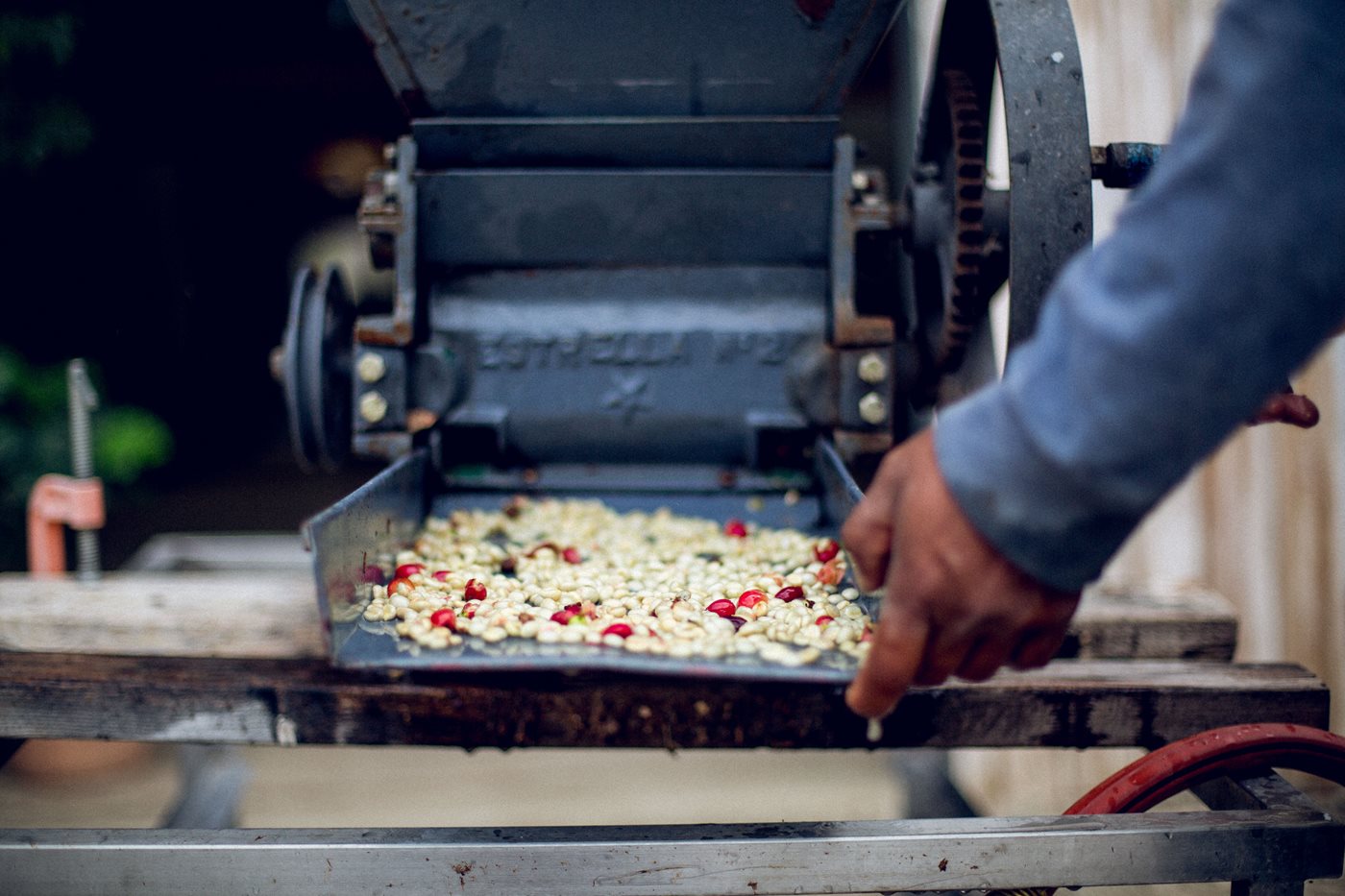
“Some people called us crazy for wanting to grow coffee in California,” says Lindsey Mesta, Chief Marketing Officer and Co-Founder at Frinj Coffee. (Photo: Matt Miller)
California has long been the pantry of America, producing up to 90% of many fruits, vegetables and nuts consumed in the country. But among the luscious groves of guavas, avocados and finger limes growing across Good Land Organic’s estate near Santa Barbara, an unlikely crop gently sways in Pacific Ocean breeze. For the first time in history, coffee is being grown commercially on the US mainland.
“Some people called us crazy for wanting to grow coffee in California,” says Lindsey Mesta, Chief Marketing Officer and Co-Founder at Frinj Coffee, the coffee producing arm of Good Land Organics. “And there were questions about whether coffee grown at 600ft elevation would be any good,” she adds. But to quash any doubts as to the quality of beans produced in the rolling hills of Santa Barbara, Frinj’s lower-range coffees score around 86, while its premium products have attained a stunning 89-92.
If you’re interested in trying Californian coffee, your best bet is to head to your nearest branch of Oakland-based coffee shop, Blue Bottle, which purchased the entirety of Frinj’s 2017 crop. Retailing for $18/oz, the Gesha and Caturra blend is yet further evidence of premiumisation in the US market, where an innovative crop of 5th Wave operators, such as east coast rival, Bluestone Lane are scaling craft coffee excellence to new heights.

The Good Land Organics estate in Santa Barbara, California, where Frinj Coffee is a processing and support hub for the state's coffee farmers. (Photo: Matt Miller)
The birth of a new US coffee industry
Since first planting coffee in 2002, Frinj has been working to scale their business to a viable commercial enterprise by expanding growing partnerships with local farms and enhancing crop resilience. A partnership with the University of California, Davis, saw Frinj develop a genetic breeding programme to select coffee varietals more attuned to the Californian climate. Still, it took nearly a decade of determined work for Frinj to produce specialty-grade coffee. In 2012 they finally began selling their first small batch specialty lots to a handful of domestic and international buyers.
Today the firm is spearheading a dramatic enlargement of California’s coffee growing capacity, literally planting the seeds for an entirely new industry. Acting as a conduit for a fledgling network of coffee producers, the Good Land Organics estate is a hub for its growing partners, supplying coffee plants, expertise and equipment to 25 partner farms across California. Frinj also washes and processes all the coffee produced and has developed a low-risk model promoting profitability for all potential partners.
“Our ‘farmer-first’ model provides impetus to become involved in the industry. We’ve structured ourselves differently from a cooperative to make sure 50-70% of our final sale price goes back to the farmer,” explains Mesta.
The 2017/18 harvest saw Frinj export its very best Gesha crop to consumers via their exclusive partnership with Blue Bottle. But Mesta expects total production, which includes their standard specialty product, to increase by 200% in 2019 as some 36,000 coffee trees in Frinj’s farm network begin to mature. “We’re hoping to see at least 50,000lbs (22.6 tonnes) of coffee coming from existing trees by 2022,” she says.
And those trees will be special because of the emphasis on organic, sustainable farm practices that Frinj has propagated among their partners. “We predominantly work with organic farmers”, explains Mesta. “And although they’re not all 100% organic, we always promote sustainable business practices.” In fact, Frinj’s local distribution network means their unique supply chain is intrinsically low carbon – delivering their product to Blue Bottle meant just a five-hour drive.
Quality not quantity – Frinj Coffee’s premium appeal
Frinj’s harvest may not quite amount to the 2.6 million-tonne hill of beans produced by Brazil annually, but as her company name suggests, Mesta is more than happy for Californian coffee to sit at the super-premium fringes of specialty coffee. And US market trends appear to be on her side, with the majority of US industry leaders surveyed by Allegra citing specialty coffee growth as the number one coffee shop trend in 2018. Even traditionally filter-coffee focused brands, such as Dunkin’ and McDonald’s are tapping into consumer demand for Arabica beans and espresso-based beverages. At the specialty end of the market, consumers are engaging with origin and coffee terroir as never before.
“There’s a very strong consumer industry in southern California, it’s one of the fastest growing specialty coffee markets in the country,” says Mesta. “There are other countries in the world that consume the majority of the coffee they produce, like Brazil, but we have the advantage that our consumers are already consuming specialty coffee.”
The popularity of Blue Bottle, in which international food giant Nestle invested a majority stake in 2017, is further evidence of US appetite for specialty coffee concepts and an ever-growing array of exotic coffee varieties available to consumers. Mesta says the chain’s 39 US stores have been the perfect stage to develop the Frinj brand and introduce Californian-grown coffee to a wider audience, a process she describes as ‘co-branding.’
“Blue Bottle took great care of the quality of the coffee – the relationship has been superb,” she says. “They were really in tune with our marketing; that this is a locally-grown, sustainable product.”

Frinj Coffee processes the crop of its 25 partner farms in California. (Photo: Matt Miller)
Could Californian coffee conquer the world?
The Blue Bottle partnership was Frinj’s first foray into the wider US specialty coffee shop market, but for Mesta and the rest of the team, it’s only the beginning. In fact, once Frinj sufficiently scales up production, Mesta says there’s huge potential for sales in the US and beyond – and that they’ll be looking for their next co-branding partnerships even further afield.
“There’s definitely opportunities for us to have a presence elsewhere in the US,” she says. “We’re growing our network and building relationships. I’d love to tap into premium markets in other countries – a lot of Asian markets seem ready for higher-end coffees and some of the most expensive coffees in the world are already sold there.
Growing coffee in California isn't cheap, with high costs for land, labour and materials alongside limited space all playing their part in keeping the fledging industry small. But with premiumization a major trend in most developed coffee shop markets, high-end Californian coffee looks set to keep raising the bar on quality – and stepping up competition to some of the world’s most exclusive varieties.
This article originally appeared on WorldCoffeePortal.com.